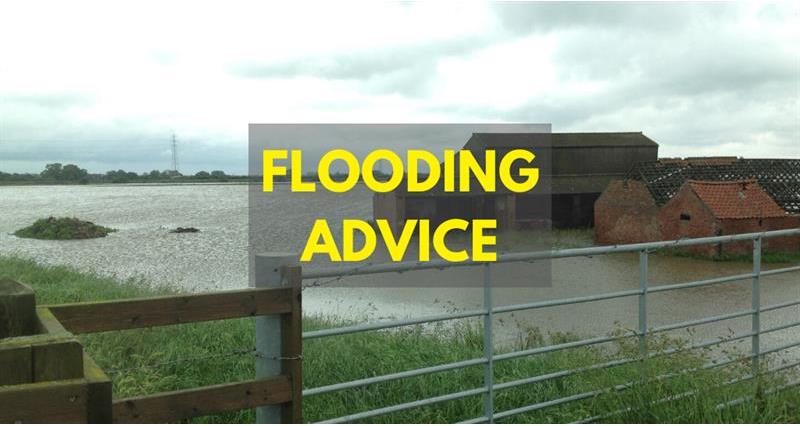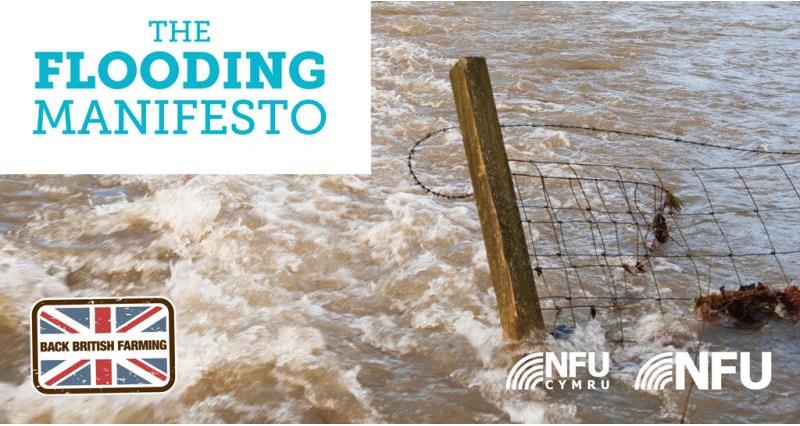- Initial steps to take if you've been affected by flooding
- Key advice for staying safe and protecting your business
- Long-term NFU asks from government
- Advice from NFU Mutual
- Further information
Have you been affected? Steps to take now
Here are the first steps to take if you and your farm business have been hit by wet weather.
Step 1
Report incidents to the Environment Agency incident hotline by calling 0800 80 70 60.
Remember to keep a record of what you report, and when.
You should also start to gather evidence including videos, pictures and flooding impacts on your farm separately. Take photos of everything damaged by flood water to support claims. Even low value items can amount to considerable sums when added together. Trying to evidence loss after an event can be difficult.
Click here for government guidance if your land has been flooded - including information on:
- Temporary measures and minor change requests
- Force majeure
- Reporting animal movements
- TB testing delays
- Other cross compliance requirements
Step 2
If you are concerned about compliance with support scheme rules the NFU can help. Contact NFU CallFirst on 0370 845 8458 and let them know the following:
- How extreme weather has impacted your farm business
- How your ability to comply with support scheme rules has been impacted (for schemes such as Countryside Stewardship or HLS).
The NFU can use this information to support any asks of government to help you update your plans and receive funding.
Key advice for staying safe and protecting your business
Act quickly if a flood alert is raised
1. Plan an escape route
Make sure you have an evacuation plan so that you and your family stay safe. Keep contact details to hand of people who can help you move your animals in an emergency.
2. Ensure you can be contacted in an emergency
Keep your phone charged up and stay in contact with people around you.
3. If time allows and the escape route is safe, move livestock and horses to higher ground and provide feed and water.
If animals are stranded and there is no accessible escape route do not attempt rescue. Do not put your life or the lives of others at risk. Contact the emergency services or the RSPCA on 0300 1234 999 for help.
Need to communicate an accurate location quickly?
- Find out about using What3Words technology to share your location.
- Get tips on using your mobile phone to send an emergency message or share your location.
Where to go for further help and advice
- Visit the YANA website for contact details for organisations that can provide additional support, including R.A.B.I., and the Farming Community Network.
- You can also get more information on dealing with stressful and challenging situations by visiting the NHS England Every Mind Matters website.
- Keep checking our Adverse weather, water and flooding toolbox for updates on flood alerts and more information on dealing with adverse weather.
Other key things to consider
Agri-environment schemes
If an agreement holder is prevented from complying with obligations associated with an agri-environment scheme they must contact the RPA within 15 days from the date on which they are in a position to do so and provide written evidence to show what has happened and how this has led to them being unable to meet the scheme rules.
EA advice: Slurry spreading in wet conditions
Read advice on what you need to do to contact the Environment Agency to discuss options if your store is at risk of causing pollution and you cannot avoid spreading when you think there is a risk of slurry runoff, run-through to land drains or leaching, or you will breach an NVZ condition.
Planning and preparation
- Sign up for Environment Agency flood alerts at the Gov.uk website.
- Make sure livestock have high land or prepare to move livestock out of harm’s way if there is a flood warning in your area.
- Identify machinery, tools or stock that could be moved to prevent loss or damage.
- Consider how you’ll alert staff about a flood warning and how they can help you to prepare.
- Ensure any chemicals or fuels are secure to prevent contamination during a flood.
Watercourses
Remember your responsibilities if you are a riparian owner. Check the NFU’s Water Maintenance Solutions guidance pack for more information.
Report any issues with main rivers to the EA or with ordinary watercourses report the issue to an Internal Drainage Board (if in a drainage district) or to the local authority.
Flooded agricultural land is still eligible for BPS if the flooding is temporary and the land would otherwise still be available for agricultural activity. Activities that take place with EA to manage floodwater positively and proactively will be considered on a case by case basis, although any agricultural land that floods temporarily would remain eligible.
Dredging
Every catchment is different and therefore a management technique in one may not be the best suited, required or feasible in another. This could be due to a plethora of reasons from ecological, economical or logistical.
What is important is the management of water in catchments through appropriate conveyance. Conveyance in this instance can be defined as the action or process of transporting or carrying water and material from one place to another.
Read our briefing and find links to the Environment Agency's perspective on dredging.
Our long-term asks from government
The NFU would like for there to be a review of the Flood Defence Grant in Aid cost-benefit analysis so that it sufficiently values agricultural land.
Farmers who are intentionally flooded in order to protect people and property are performing a public good and should therefore be reimbursed for the public good being provided.
The NFU would like to see the EA prioritise essential maintenance of flood defence assets and watercourses which have been neglected for decades.
The NFU would like to encourage the EA to improve communications on flood risk: systems for communicating with those affected must be accurate and reach the most remote communities, providing sufficient time for response.
With the government’s targets for increased housing, with 50% of the proposed new homes planned on being built on floodplains, local authorities are looking to Sustainable Drainage Systems (SuDS) to protect homes from flooding. In order for this to be a viable option, Schedule 3 of the Flood and Water Management Act 2010 must be fully implemented. This will ensure that SuDS are maintained for the lifespan of the development and that farmers are not responsible for said maintenance or liable for the SuDS.
Finally, the NFU would encourage the government to amend the Land Drainage Act 1991 to allow for the creation or expansion of Internal Drainage Boards (IDBs). IDBs are dealing with more and more water from urban expanses, our farming members in Internal Drainage Districts pay their drainage charges however, the urban areas being protected are not, and without the amendment to the Land Drainage Act this is not possible.
Advice from NFU Mutual
- Work out a farm flood plan so that if the worst does happen everybody knows what action to take and who is responsible for what.
- Identify higher ground that livestock can be moved to if water levels rise. If you're renting land in a low-lying area it's worth speaking with neighbouring landowners to obtain permission to move livestock to their higher ground.
- Move vulnerable machinery stock and veterinary resupplies to safe locations if flooding is forecast.
- Safely store fuels and chemicals that could pollute water courses in the event of flooding.
- Look at your farming practices and how these could impact on flooding and water penetration. Take steps to reduce soil compaction in fields and think about creating runoff ponds.
- Think about flood resilience measures for buildings which could be vulnerable to flooding. Think about locating electrical sockets and wiring higher up walls so that they're not susceptible to flooding if water gets in.
- If you're planning to invest in new buildings, speak to your insurer first to ensure that they can provide flood cover at that specific location.
NFU Mutual's emergency contact number is 0800 282 652 or contact your local office.
Further information
- Visit our adverse weather, water and flooding toolbox for useful links for real-time weather, tidal and flooding information
- Gov.uk: Check the long term flood risk for an area in England
- Gov.uk: Check for flooding in England
- AHDB Knowledge Library: Weather

